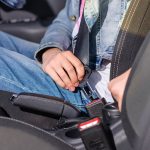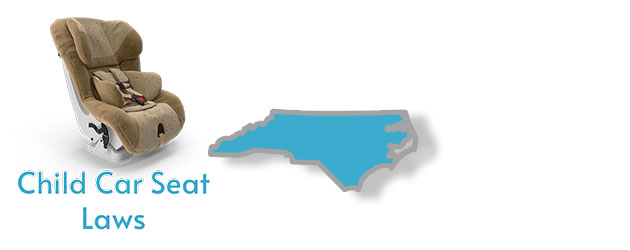What Are the Height and Weight Requirements for Car Seats in North Carolina?

Children should remain rear-facing until at least age 2 or until they exceed the seat’s top weight and height limits.
Children who have outgrown the rear-facing weight and height limits can graduate to forward-facing seats.
North Carolina law requires children younger than 8 years or those weighing less than 80 pounds to be secured in the appropriate child safety seat.
Children who have outgrown forward-facing seats can ride on booster seats until they reach age 8 or until they weigh 80 pounds.
Children younger than 5 years who weigh less than 40 pounds should be secured in the back seat.
What Are the Rear Facing Car Seat Laws in North Carolina?

North Carolina does not have specific rules for rear-facing seats. However, the law says any child restraint device must be used in accordance with the manufacturer’s instructions. This means a child can legally graduate to the next seat as long as he or she has exceeded the minimum age and weight requirements set by the manufacturer (at least 20 pounds and age of 1 year).
According to the AAP (American Academy of Pediatrics), children should remain rear-facing until at least age 2 or until they exceed the seat’s top weight and height limits. This is because the rear-facing position is considered safer as the back of the seat helps in protecting the child’s fragile body parts such as the neck and spine in the event of a crash.
Parents can opt for infant-only seats for their newborn and then switch to convertible seats as the baby grows bigger. Convertible seats allow you to keep your baby rear-facing for a longer period (up to age 4) due to their higher weight limit (up to 40 pounds). Seats of this type should be installed in the rear of the car according to the manufacturer’s instructions.
What Are the Forward Facing Car Seat Laws in North Carolina?

Once children outgrow the rear-facing seat’s weight and height limits, they can graduate to forward-facing seats. Typically, this happens at age 2-4 years and when weight is at least 40 pounds. The seat used must be equipped with a harness and should be installed in a forward facing manner. The harness straps must be snug above the child’s collarbone. If fastened properly or according to the manual’s instructions, the straps and tether should help in spreading the impact forces across the more mature parts of the child’s body (shoulders, hips, and chest) in case of a crash. You can use a lap-only belt, lap-shoulder belt, or a latch system together with the seat to maximize protection.
Many forward-facing seats can support up to 65 pounds, so children can safely remain forward-facing until age 7.
What Are the Booster Seat Laws in North Carolina?

North Carolina law requires children younger than 8 years or those weighing less than 80 pounds to be secured in the appropriate child safety seat. This means children who have outgrown forward-facing seats can ride on booster seats until they reach age 8 or until they weigh 80 pounds. A booster seat is designed to lift children so that they can safely fit in seat belts. For a child to be properly fitted, the shoulder belt should be snug across the chest area, and the lap belt should lie low and snug across the upper thighs. There are two different types of booster seats. A high-back booster seat is used when there are no headrests to support a child while a backless booster is preferred when the back seats already have headrests.
Booster seats should be secured with lap-shoulder belts (not lap-only belts) or with a latch system. While the law provides the age and weight requirements for seat belts, most experts agree that a height of 4’9” is required to fit in safety belts. This is because seat belts are manufactured with the height of an average adult in mind, so anyone shorter may not be safe in a safety belt. Typically, children reach this height when they are between 8-12 years. Also, for your child to be ready to use a seat belt, he or she should be able to sit all the way back against the seat and with knees bent above the edge of the seat without slouching.
When Can a Child Use the Front Seat in North Carolina?

The law requires children younger than 5 years who weigh less than 40 pounds to be secured in the back seat if the car has an active passenger-side front airbag. Exceptions to this law apply if the child restraint system is designed for use with airbags or if the car has no rear seat. According to the AAP, all children should remain in the back seat until they are 13 years old. This is because the back seat is generally safer and does not contain airbags that can be lethal to children.
Is it Illegal to Leave a Child Alone in a Car in North Carolina?
The state does not have a law regarding children left in cars. However, some places have made it illegal to leave a child unattended inside a car. So be sure to check your local laws. It is not recommended that you leave your child unattended in a vehicle for any length of time.
Is it Illegal to Smoke in a Car With a Child in North Carolina?
No law makes it illegal to smoke in a car with child passengers, although it is not recommended to smoke in a vehicle with children.
Are Car Seats Required in Taxis and Emergency Vehicles in North Carolina??

Ambulances and other emergency vehicles are exempted from complying with the state’s car seat laws. Also exempted are vehicles that are not required by federal law to be equipped with seat belts. Commercial vehicles such as taxis are required to comply with child passenger restraint laws. School buses weighing less than 10,000 pounds are required to have seat belts installed.
In instances where all seating positions equipped with seat belts or child restraint devices are occupied, a child younger than 8 years who weighs 40-80 pounds can be secured with only a lap belt.
What Are the Car Seat Replacement Laws in North Carolina?
No law covers the replacement of car seats. Parents should follow the manufacturer’s instructions included in the manual or contact the manufacturer in case of peculiar situations. It is also a good idea to replace car seats after an accident. This is because the seats can develop tiny cracks which may be hard to spot and can be dangerous to children.
More North Carolina Laws
- All Voter Fraud Theories in the 2020 United States Election Debunked
- Anonymous Payment Methods: Can you pay someone incognito?
- Can a Convicted Felon Run for President? (2026 Legal Guide)
- Can an Employer Record Conversations Without Consent?
- Can Felon’s Travel Outside the US: What Countries Can You Travel to with a Felony?
- Can I get a passport with a criminal record in Australia?
- Can I Sue Someone for Recording Me on Private or Public Property?
- Can you collect unemployment after being incarcerated in the US?
- Can you get a speeding ticket without being pulled over?
- Cease & Desist Letter
- CPS Case Laws: How long does a CPS (Child Protective Services) conviction stay on your record?
- Dashboard Camera Legality and Privacy Laws: Is it Illegal to Use Dashcams in North America?
- Does a Failed Drug Test Show Up on Your Record?
- Does CPS notify the other parent?
- E-mail Account Security Explained: What is the most secure e-mail service?
- EU Audio and Video Recording Laws
- Free Bicycle Bill of Sale Template
- Free Boat Bill of Sale Template
- Free Cat Bill of Sale Template
- Free Furniture Bill of Sale Template
- Free Gun Bill of Sale Template
- Free Livestock Bill of Sale Template
- Free Motor Vehicle Bill of Sale Template
- Free Motorcycle Bill of Sale Template
- Free Pet Bill of Sale Template
- Free RV Bill of Sale Template
- Free Trailer Bill of Sale Template
- HIPAA Compliant CRM Software – The best of 2022
- Homicide Cold Case Repository – Are Cold Case Files Available to the Public?
- How Long Do Hospitals Keep Medical Records?
- How Long is a Life Sentence? State by State Overview
- How Old Do You Have to Be to Buy a Lighter?
- How to Block Listening Devices: Can a Phone or Other Device Secretly Record You?
- How to Check if Your Record Has Been Expunged
- How to Find Old Medical Records Online
- How to Find Recent Arrest Records: Are Criminal Records Public?
- How to Hide an Ankle Monitor
- How to Look up Old Murders: Can Anyone Look at Old Case Files?
- How to Record a Phone Call: Can you tape calls on Android or IOS without installing an app?
- How to Record Phone Calls on Android Devices
- How to Seek Protection Under the CDC Eviction Moratorium
- Is it Illegal to Video Record Someone Without Their Consent?
- Is My Phone Listening to Me?
- Legal Copyright Disclaimers: What Disclaimers are Needed on my Website?
- Legal Transaction Management Software
- Medical Records Retention Laws By State (2026 Guide)
- Partnership Agreement Template
- Photo Video Recording Consent Form
- Privacy Tools for Android, IOS, and Windows: What is the best privacy software?
- Road Rage Laws: Endangering Other People On a Highway is a Punishable Offense
- Service Agreement Template
- The Most Expensive Criminal and Civil Fines: Who paid the largest fine in recent history and why?
- The Safest Browser: How to Browse and Download Anonymously
- Traveling With a Criminal Record: Are felons allowed to travel outside Canada?
- Types of Ankle Monitors : Types, Crimes, Payment
- Types of Evidence in Law: How many types of evidence are there?
- Was The Recording of the Telephone Conversation between President Trump and Brad Raffensperger Legal
- Was The Recording of the Telephone Conversation between President Trump and Brad Raffensperger Legal
- Weird Christmas Laws From Around The World
- What does a criminal fine mean and who paid the largest criminal fine in US history?
- What is a Bill of Sale?
- What is a VPN? How does it work? And the legal implications of using a Virtual Private Network
- What is Considered Spoliation of Evidence, and how do you Prove it?
- What to Wear to Court
- Why Should You Not Let Police Touch Your Tail Lights
